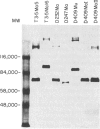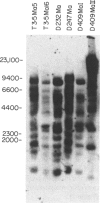Abstract
To determine whether the major histocompatibility complex (MHC) phenotype of cattle could affect the parasite strain specificity of immunity to Theileria parva by influencing the antigenic specificity of Theileria-specific cytotoxic T lymphocytes (CTL), we investigated the parasite strain specificity of Theileria-specific CTL clones derived from cattle of different class I MHC phenotypes. Thirty-one class I-restricted CTL clones were generated from four cattle immunized with the Muguga stock of T. parva. The MHC restriction and parasite strain specificities were determined for each clone utilizing as targets, parasitized cell lines of different MHC phenotypes and cloned cell lines containing different parasite strains. CTL clones restricted by the same MHC determinant had similar parasite strain specificities. On the other hand, clones restricted by different MHC determinants exhibited different parasite strain specificities. This was true whether the clones were generated from the same animal or from different cattle and tested on a target cell line expressing both MHC determinants. These results provide strong evidence that differences in the strain specificities of CTL derived from animals immunized with the same parasite stock, are determined by the class I MHC phenotype of the immunized animal.
Full text
PDF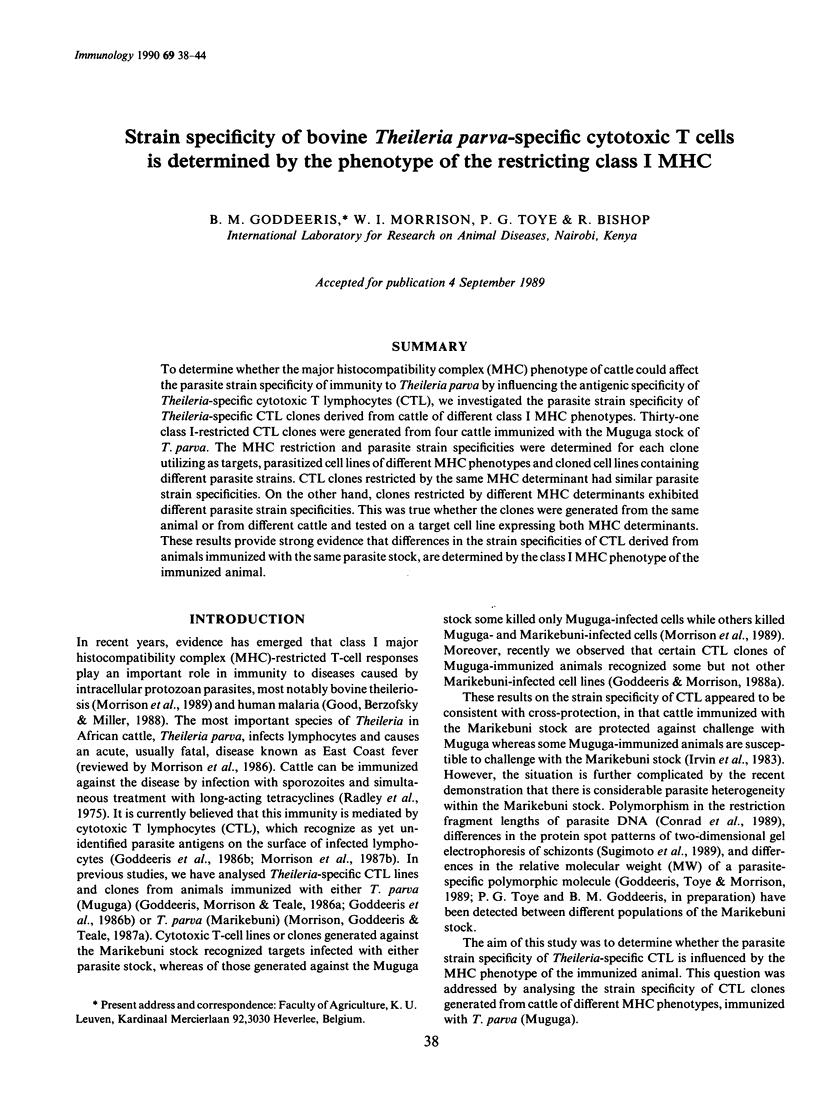
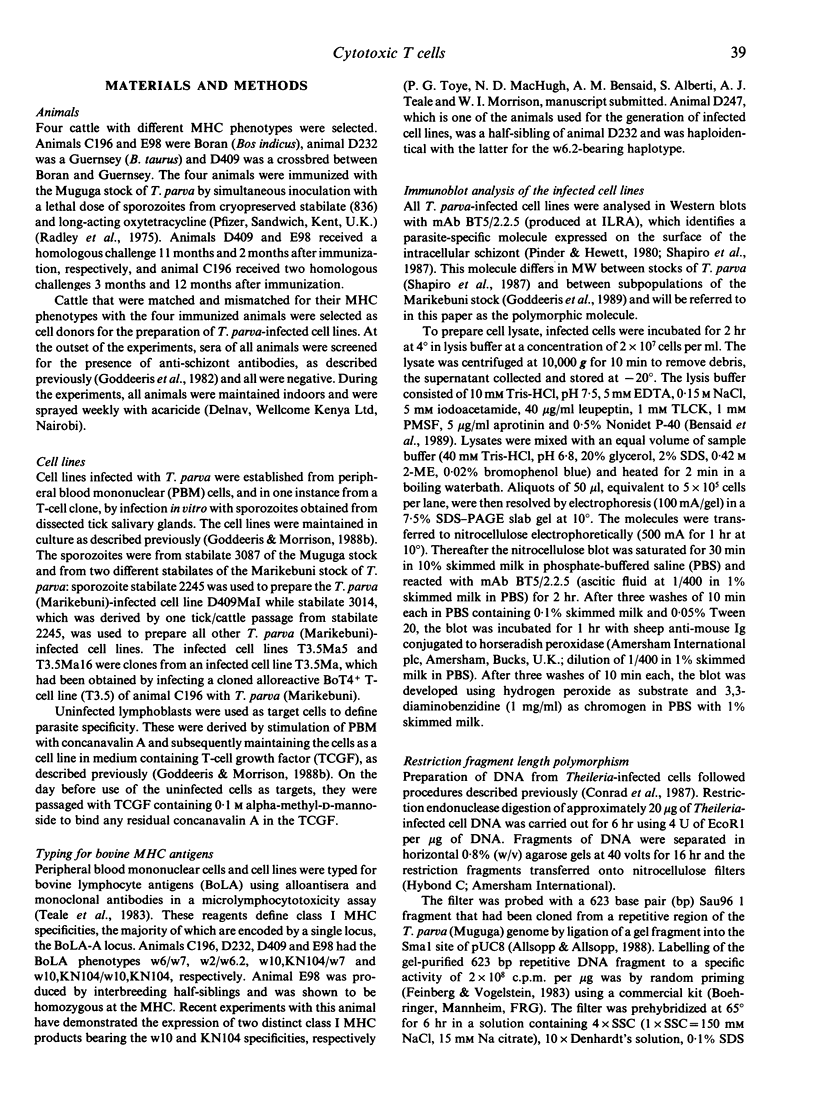
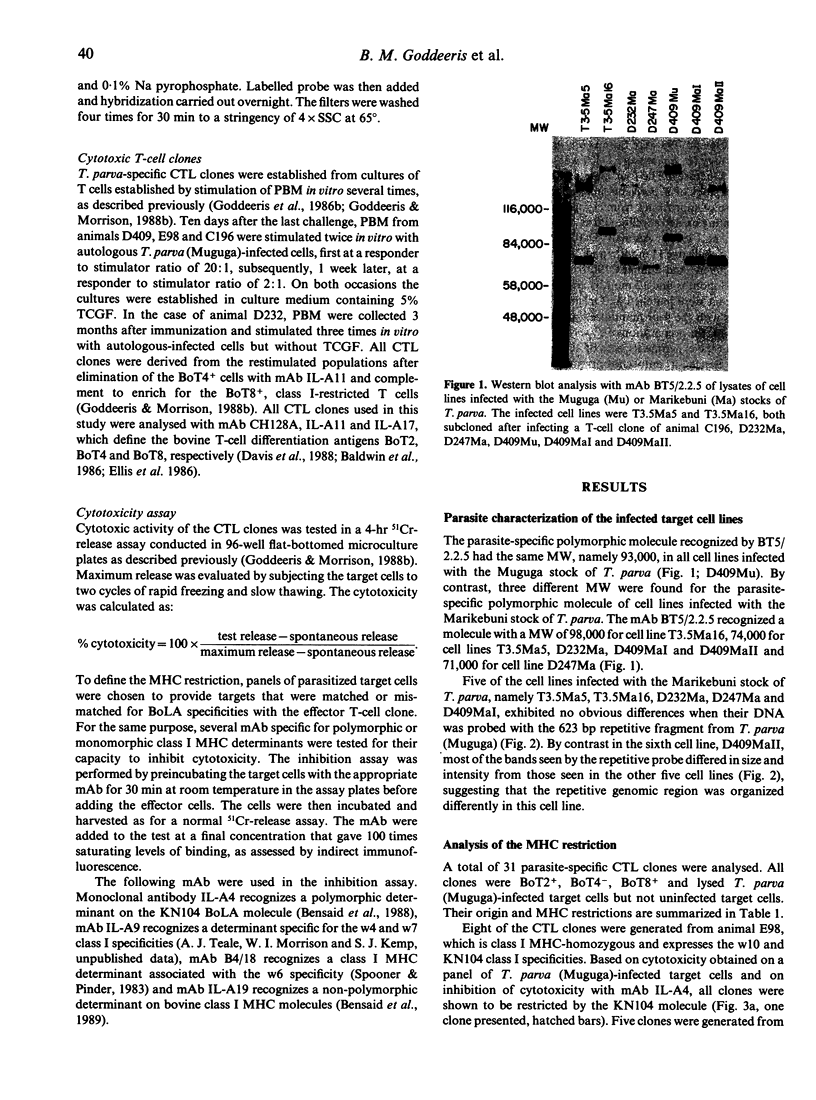
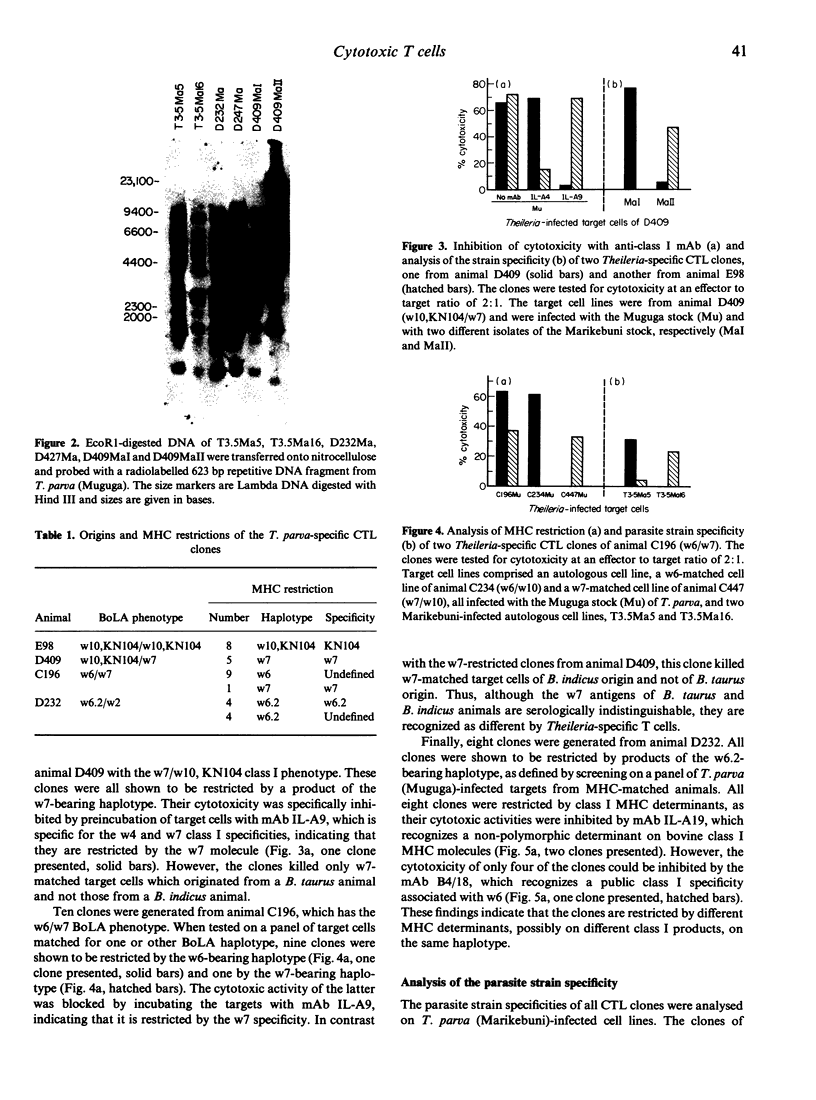
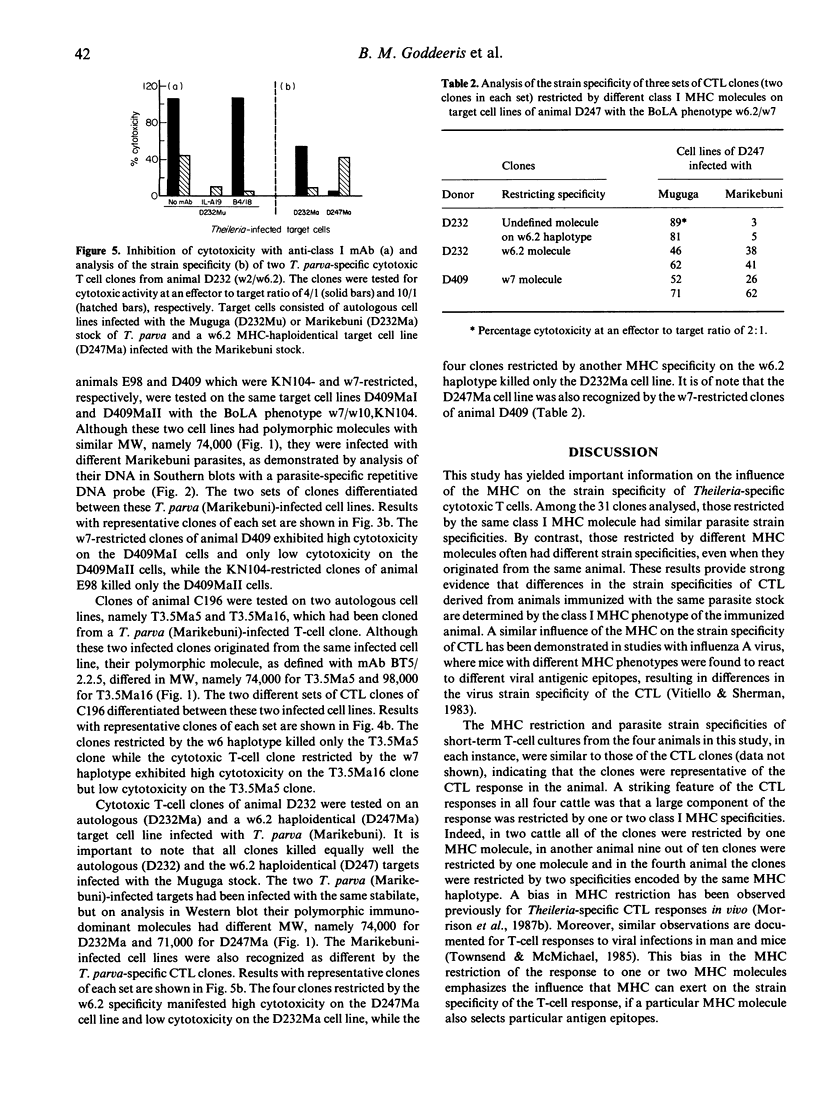
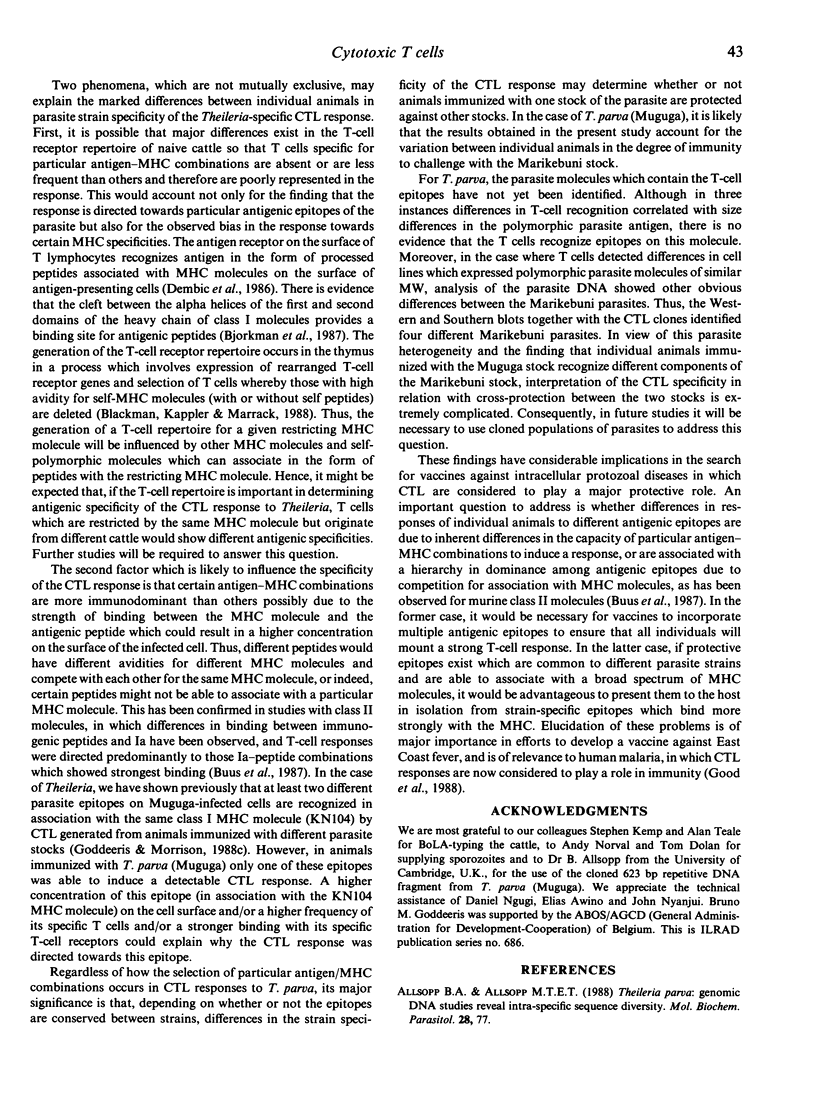
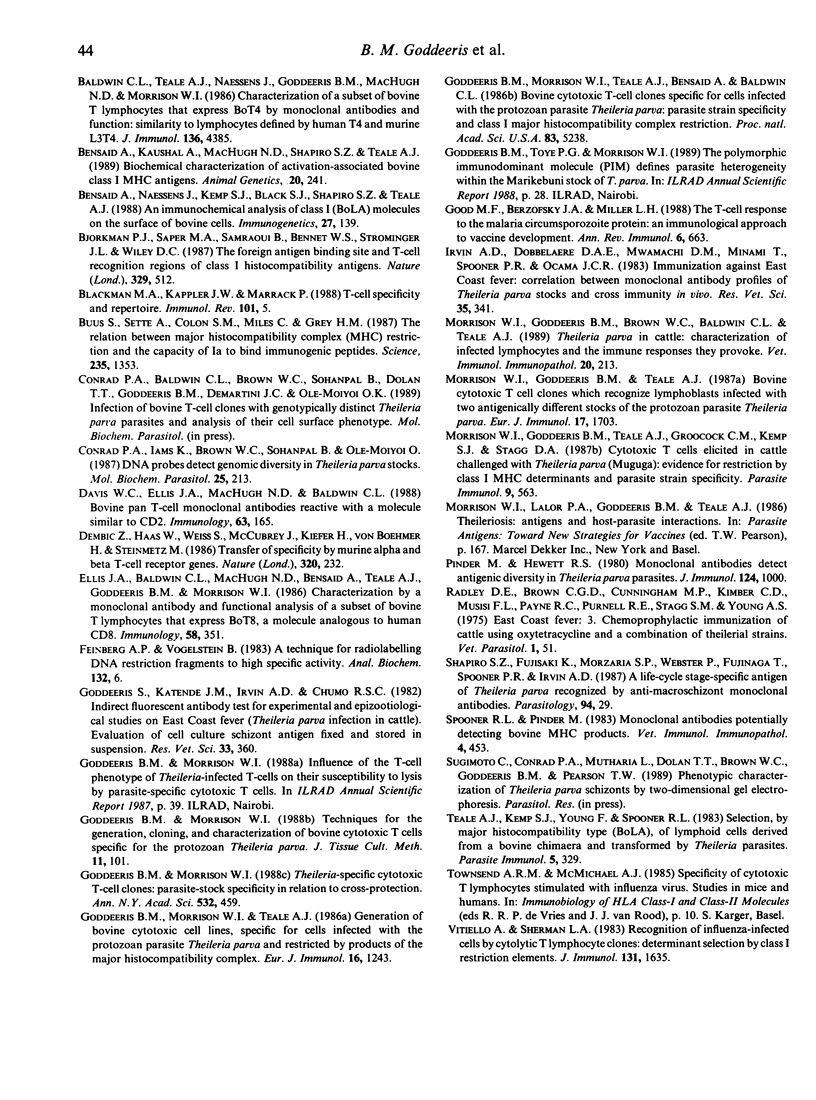
Images in this article
Selected References
These references are in PubMed. This may not be the complete list of references from this article.
- Allsopp B. A., Allsopp M. T. Theileria parva: genomic DNA studies reveal intra-specific sequence diversity. Mol Biochem Parasitol. 1988 Feb;28(1):77–83. doi: 10.1016/0166-6851(88)90183-1. [DOI] [PubMed] [Google Scholar]
- Baldwin C. L., Teale A. J., Naessens J. G., Goddeeris B. M., MacHugh N. D., Morrison W. I. Characterization of a subset of bovine T lymphocytes that express BoT4 by monoclonal antibodies and function: similarity to lymphocytes defined by human T4 and murine L3T4. J Immunol. 1986 Jun 15;136(12):4385–4391. [PubMed] [Google Scholar]
- Bensaid A., Kaushal A., Machugh N. D., Shapiro S. Z., Teale A. J. Biochemical characterization of activation-associated bovine class I major histocompatibility complex antigens. Anim Genet. 1989;20(3):241–255. doi: 10.1111/j.1365-2052.1989.tb00865.x. [DOI] [PubMed] [Google Scholar]
- Bensaid A., Naessens J., Kemp S. J., Black S. J., Shapiro S. Z., Teale A. J. An immunochemical analysis of class I (BoLA) molecules on the surface of bovine cells. Immunogenetics. 1988;27(2):139–144. doi: 10.1007/BF00351089. [DOI] [PubMed] [Google Scholar]
- Bjorkman P. J., Saper M. A., Samraoui B., Bennett W. S., Strominger J. L., Wiley D. C. The foreign antigen binding site and T cell recognition regions of class I histocompatibility antigens. Nature. 1987 Oct 8;329(6139):512–518. doi: 10.1038/329512a0. [DOI] [PubMed] [Google Scholar]
- Blackman M. A., Kappler J. W., Marrack P. T-cell specificity and repertoire. Immunol Rev. 1988 Jan;101:5–19. doi: 10.1111/j.1600-065x.1988.tb00730.x. [DOI] [PubMed] [Google Scholar]
- Buus S., Sette A., Colon S. M., Miles C., Grey H. M. The relation between major histocompatibility complex (MHC) restriction and the capacity of Ia to bind immunogenic peptides. Science. 1987 Mar 13;235(4794):1353–1358. doi: 10.1126/science.2435001. [DOI] [PubMed] [Google Scholar]
- Conrad P. A., Iams K., Brown W. C., Sohanpal B., ole-MoiYoi O. K. DNA probes detect genomic diversity in Theileria parva stocks. Mol Biochem Parasitol. 1987 Oct;25(3):213–226. doi: 10.1016/0166-6851(87)90085-5. [DOI] [PubMed] [Google Scholar]
- Davis W. C., Ellis J. A., MacHugh N. D., Baldwin C. L. Bovine pan T-cell monoclonal antibodies reactive with a molecule similar to CD2. Immunology. 1988 Jan;63(1):165–167. [PMC free article] [PubMed] [Google Scholar]
- Dembić Z., Haas W., Weiss S., McCubrey J., Kiefer H., von Boehmer H., Steinmetz M. Transfer of specificity by murine alpha and beta T-cell receptor genes. Nature. 1986 Mar 20;320(6059):232–238. doi: 10.1038/320232a0. [DOI] [PubMed] [Google Scholar]
- Ellis J. A., Baldwin C. L., MacHugh N. D., Bensaid A., Teale A. J., Goddeeris B. M., Morrison W. I. Characterization by a monoclonal antibody and functional analysis of a subset of bovine T lymphocytes that express BoT8, a molecule analogous to human CD8. Immunology. 1986 Jul;58(3):351–358. [PMC free article] [PubMed] [Google Scholar]
- Feinberg A. P., Vogelstein B. A technique for radiolabeling DNA restriction endonuclease fragments to high specific activity. Anal Biochem. 1983 Jul 1;132(1):6–13. doi: 10.1016/0003-2697(83)90418-9. [DOI] [PubMed] [Google Scholar]
- Goddeeris B. M., Katende J. M., Irvin A. D., Chumo R. S. Indirect fluorescent antibody test for experimental and epizootiological studies on East coast fever (Theileria parva infection in cattle). Evaluation of a cell culture schizont antigen fixed and stored in suspension. Res Vet Sci. 1982 Nov;33(3):360–365. [PubMed] [Google Scholar]
- Goddeeris B. M., Morrison W. I., Teale A. J., Bensaid A., Baldwin C. L. Bovine cytotoxic T-cell clones specific for cells infected with the protozoan parasite Theileria parva: parasite strain specificity and class I major histocompatibility complex restriction. Proc Natl Acad Sci U S A. 1986 Jul;83(14):5238–5242. doi: 10.1073/pnas.83.14.5238. [DOI] [PMC free article] [PubMed] [Google Scholar]
- Goddeeris B. M., Morrison W. I., Teale A. J. Generation of bovine cytotoxic cell lines, specific for cells infected with the protozoan parasite Theileria parva and restricted by products of the major histocompatibility complex. Eur J Immunol. 1986 Oct;16(10):1243–1249. doi: 10.1002/eji.1830161010. [DOI] [PubMed] [Google Scholar]
- Good M. F., Berzofsky J. A., Miller L. H. The T cell response to the malaria circumsporozoite protein: an immunological approach to vaccine development. Annu Rev Immunol. 1988;6:663–688. doi: 10.1146/annurev.iy.06.040188.003311. [DOI] [PubMed] [Google Scholar]
- Irvin A. D., Dobbelaere D. A., Mwamachi D. M., Minami T., Spooner P. R., Ocama J. G. Immunisation against East Coast fever: correlation between monoclonal antibody profiles of Theileria parva stocks and cross immunity in vivo. Res Vet Sci. 1983 Nov;35(3):341–346. [PubMed] [Google Scholar]
- Morrison W. I., Goddeeris B. M., Brown W. C., Baldwin C. L., Teale A. J. Theileria parva in cattle: characterization of infected lymphocytes and the immune responses they provoke. Vet Immunol Immunopathol. 1989 Feb;20(3):213–237. doi: 10.1016/0165-2427(89)90003-2. [DOI] [PubMed] [Google Scholar]
- Morrison W. I., Goddeeris B. M., Teale A. J. Bovine cytotoxic T cell clones which recognize lymphoblasts infected with two antigenically different stocks of the protozoan parasite Theileria parva. Eur J Immunol. 1987 Dec;17(12):1703–1709. doi: 10.1002/eji.1830171205. [DOI] [PubMed] [Google Scholar]
- Morrison W. I., Goddeeris B. M., Teale A. J., Groocock C. M., Kemp S. J., Stagg D. A. Cytotoxic T-cells elicited in cattle challenged with Theileria parva (Muguga): evidence for restriction by class I MHC determinants and parasite strain specificity. Parasite Immunol. 1987 Sep;9(5):563–578. doi: 10.1111/j.1365-3024.1987.tb00530.x. [DOI] [PubMed] [Google Scholar]
- Pinder M., Hewett R. S. Monoclonal antibodies detect antigenic diversity in Theileria parva parasites. J Immunol. 1980 Feb;124(2):1000–1001. [PubMed] [Google Scholar]
- Spooner R. L., Pinder M. Monoclonal antibodies potentially detecting bovine MHC products. Vet Immunol Immunopathol. 1983 May;4(4):453–458. doi: 10.1016/0165-2427(83)90005-3. [DOI] [PubMed] [Google Scholar]
- Teale A. J., Kemp S. J., Young F., Spooner R. L. Selection, by major histocompatibility type (BoLA), of lymphoid cells derived from a bovine chimaera and transformed by Theileria parasites. Parasite Immunol. 1983 May;5(3):329–335. doi: 10.1111/j.1365-3024.1983.tb00748.x. [DOI] [PubMed] [Google Scholar]
- Vitiello A., Sherman L. A. Recognition of influenza-infected cells by cytolytic T lymphocyte clones: determinant selection by class I restriction elements. J Immunol. 1983 Oct;131(4):1635–1640. [PubMed] [Google Scholar]



